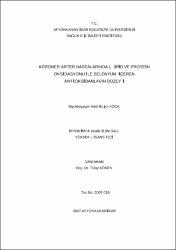| dc.contributor.advisor | Köken, Tülay | |
| dc.contributor.author | Koca, Halit Buğra | |
| dc.date.accessioned | 2015-04-09T07:59:08Z | |
| dc.date.available | 2015-04-09T07:59:08Z | |
| dc.date.issued | 2007 | |
| dc.date.submitted | 2007 | |
| dc.identifier.uri | http://hdl.handle.net/11630/3733 | |
| dc.description.abstract | Ateroskleroz, arterlerde kalınlasma ve elastikiyet kaybı ile kendini gösteren ve
özellikle aorta, koroner ve serebral arterleri tutan bir damar hastalığıdır. Ateroskleroz
patojenezi ile ilgili çesitli hipotezler öne sürülmüstür. Bu hipotezler arasında en
geçerli olanı oksidatif stres hipotezidir.
Oksidatif stres basit bir sekilde, vücudun antioksidan savunması ile serbest
radikal üretimi arasındaki dengesizlik olarak tanımlanabilir. Reaktif oksijen türlerine
(ROS) karsı enzimatik korumayı sağlayan, protein oksidasyonu ve DNA’ daki hasarı
önleyen Süperoksit dismutaz (SOD), katalaz (CAT), glutatyon peroksidaz (GPx),
glutatyon redüktaz (GSSG-R) gibi çesitli enzim sistemleri vardır. Klinik çalısmalar,
aterosklerotik hastalarda antioksidan aktivenin azaldığını göstermektedir. Bununla
beraber ateroskleroz ile antioksidan markerlarının seviyeleri arasındaki iliski tam
bilinmektedir.
Koroner kalp hastalığında serum lipid profillerinin değistiği belirtilmektedir.
Ateroskleroz gelismesine en ciddi katkısı olan lipid fraksiyonu düsük dansiteli
lipoprotein (LDL)-kolesteroldür. Plazmada LDL-kolesterolün artması ile
subendotelyal bölgede depolanma ve inflamatuar hücre yanıtının basladığı kabul
edilir. Epidemiyolojik çalısmalar, toplumların total ve LDL-kolesterol düzeyleri
yükseldikçe koroner arter hastalığı riskinin arttığını göstermistir.
Bu çalısmada, koroner anjiyografi yapılan 59 hasta (21 kadın, 38 erkek) tıkalı
damar sayılarına göre 3 gruba ayrıldı. I. grup bir damarı tıkalı olanlardan (n= 21), II.
grup iki damarı tıkalı olanlardan (n= 18) ve III. grup üç damarı tıkalı olanlardan (n=
20) olusturuldu. Kontrol grubunu, koroner anjiyografi sonucu normal olan 12’si
kadın ve 7’si erkek 19 kisi olusturdu. Alınan kan örneklerinden serumda lipid
panellerine, plazmadan malondialdehit (MDA), protein karbonil içeriği (PCO) ve
plazma sülfhidril (-SH) grupları, eritrosit redükte glutatyon (GSH) düzeyleri, GPx ve
GSSG-R aktiviteleri ölçüldü.Yapılan çalısmalar sonucunda koroner kalp hastalarında kontrol grubuna göre
plazma MDA düzeyinin arttığı, eritrosit GPx aktivitesinin azaldığı gözlemlendi.
Plazma karbonil ve –SH düzeylerinde, serum total kolesterol, trigliserid, LDL,
VLDL ve HDL kolesterol düzeylerinde, eritrosit GSH düzeyleri ve GSSG-R
aktivitelerinde çalısma grubu ile kontrol grubu arasında istatistiksel olarak anlamlı
bir farklılık bulunmadı.
Bu çalısmada aterosklerotik hastalarda lipid peroksidasyonunun arttığını ve
antioksidan bir enzim olan GPx seviyesinin azaldığını bulduk. Damar tıkanıklığı ile
lipid paneli arasında bir korelasyonun bulunmaması, lipid panelinin aterosklerozun
her zaman erken göstergesi olamayacağını ortaya koymustur. Aterosklerozda MDA
düzeyinin artması ve GPx aktivitesinin azalması nedeniyle, klinikte bu
parametrelerin lipid paneli ile birlikte bakılması aterosklerozun erken tanısında
yararlı olabilir. Bu düsüncenin geçerliliği için daha ileri çalısmalara gerek vardır. | en_US |
| dc.description.abstract | Atherosclerosis is a vessel disease that it shows is self with becoming thick and
losing flexibility of arteries, and catchs especially aorta, coronary and cerebral
arteries. There is a variety of hypothesis about the pathogenesis of atherosclerosis
which is suggested. The most common valid hypothesis among them is the
hypothesis of oxidative stress.
The oxidative stress can be basically defined as a unbalance between the
antioxidant defence and free radicals production of body. Enzymatic protection
against ROS and the breakdown products of peroxidized lipids and oxidized protein
and DNA is provided by many enzyme systems such as superoxide dismutase
(SOD), catalase (CAT), glutathione peroxidase (GPx) and glutathione reductase
(GSSG-R). Clinical studies shows that on atherosclerotic patients the activity of
antioxidant becomes less. However the relation between atherosclerosis and levels of
antioxidant markers is not known entirely.
It has been noted that in the coronary heart disease the profiles of serum lipid
is changing. In the development of atherosclerosis the most serious contrubition that
of lipid fraction is low density lipoprotein (LDL)-cholesterol. It is accepted that by
the increase in LDL-cholesterol, the store in subendothelial area and response of
inflammatuary cell starts. Epidemiological studies has shown that by the increase in
LDL- cholesterol levels of societies, the risk of coronary arteries disease is also
increasing.
In this study, 59 patients (21 women, 38 men) who undergoing coronary
angiography that divided in 3 groups according to their number of obstructed
coronaries; one vessel (n=21), two vessels (n=18) and three vessels (n=20). The
subjects with normal coronary angiograms (n=19, 12 women, 7 men) were evaluated
as controls. Serum lipid panels, plasma malondialdehyde (MDA), protein carbonyls
(PCO), total sulfhydryl (-SH) levels, erythrocyte glutathione (GSH) levels, GPx and GSSG-R activities measured from the blood samples taken from patients and
controls.
As the result of study, on coronary heart patients were observed that the plasma
MDA levels were increased, the erythrocyte GPx activities were decreased with
regard to control group. No statistical significant relation has been found on PCO and
-SH levels, serum total cholesterol, trygliseride, LDL, very low density lipoprotein
(VLDL) and high density lipoprotein (HDL) collestrol levels, erytrocyte GSH levels
and GSSG-R activities between patients and control groups.
In this study, we found that increase of lipid peroxidation and decrease of
GPx level which is an antioxidant enzyme on the atherosclerotic patients. The
lacking of correlation between vessel obstruction and lipid panel has revealed that
lipid panel wouldn’t be the early indicator of atheosclerosis in all instances. Since the
increase of MDA level and GPx activity in aterosclerosis, it would be benefical to
checking these parameters in clinic with lipid panel in order to make early diagnosis
of atherosclerosis. For validity of these ideas, there is a necessary to more advanced
studies. | en_US |
| dc.language.iso | tur | en_US |
| dc.publisher | Afyon Kocatepe Üniversitesi, Sağlık Bilimleri Enstitüsü | en_US |
| dc.rights | info:eu-repo/semantics/openAccess | en_US |
| dc.subject | Ateroskleroz | en_US |
| dc.subject | Oksidatif Stres | en_US |
| dc.subject | Antioksidanlar | en_US |
| dc.subject | LDL | en_US |
| dc.title | Koroner Arter Hastalarında Lipid ve Protein Oksidasyonu ile Selenyum İçeren Antioksidanların Düzeyi | en_US |
| dc.title.alternative | Lipid and protein oxidation and levels of selenium containing antioxidants in coronary artery patients | en_US |
| dc.type | masterThesis | en_US |
| dc.department | Afyon Kocatepe Üniversitesi, Sağlık Bilimleri Enstitüsü, Temel Tıp Bilimleri | en_US |
| dc.authorid | TR109394 | en_US |
| dc.relation.publicationcategory | Tez | en_US |



















